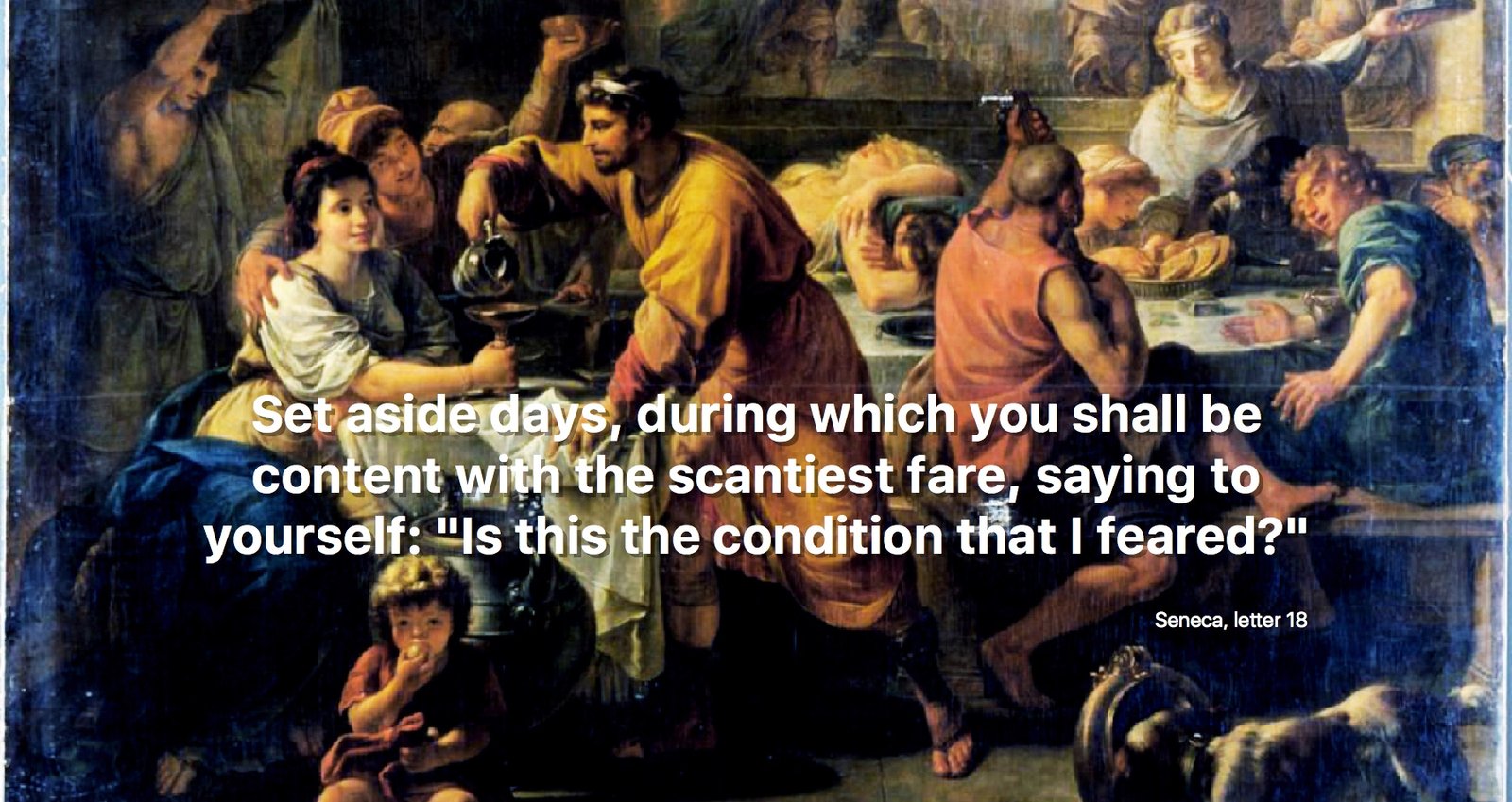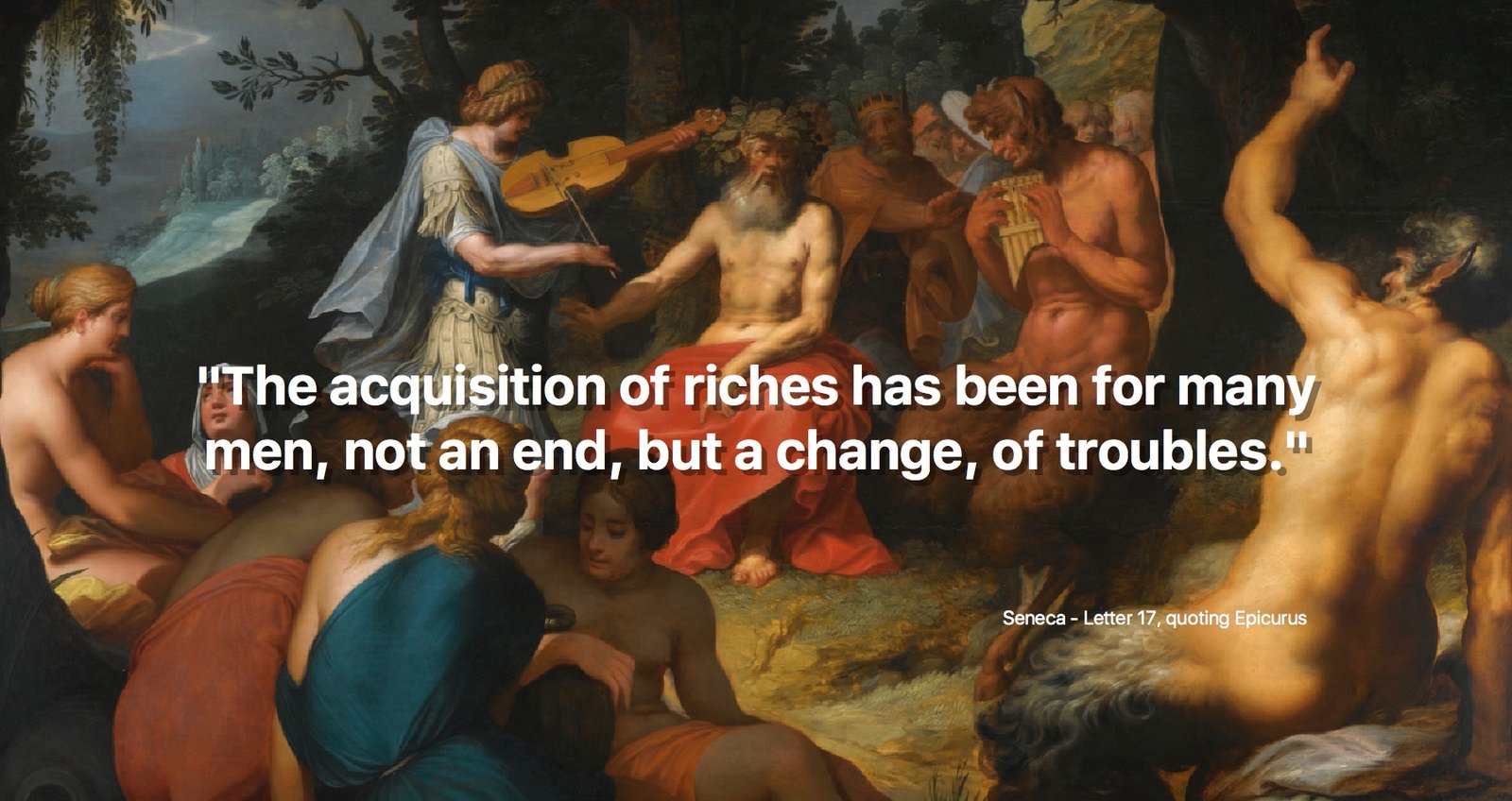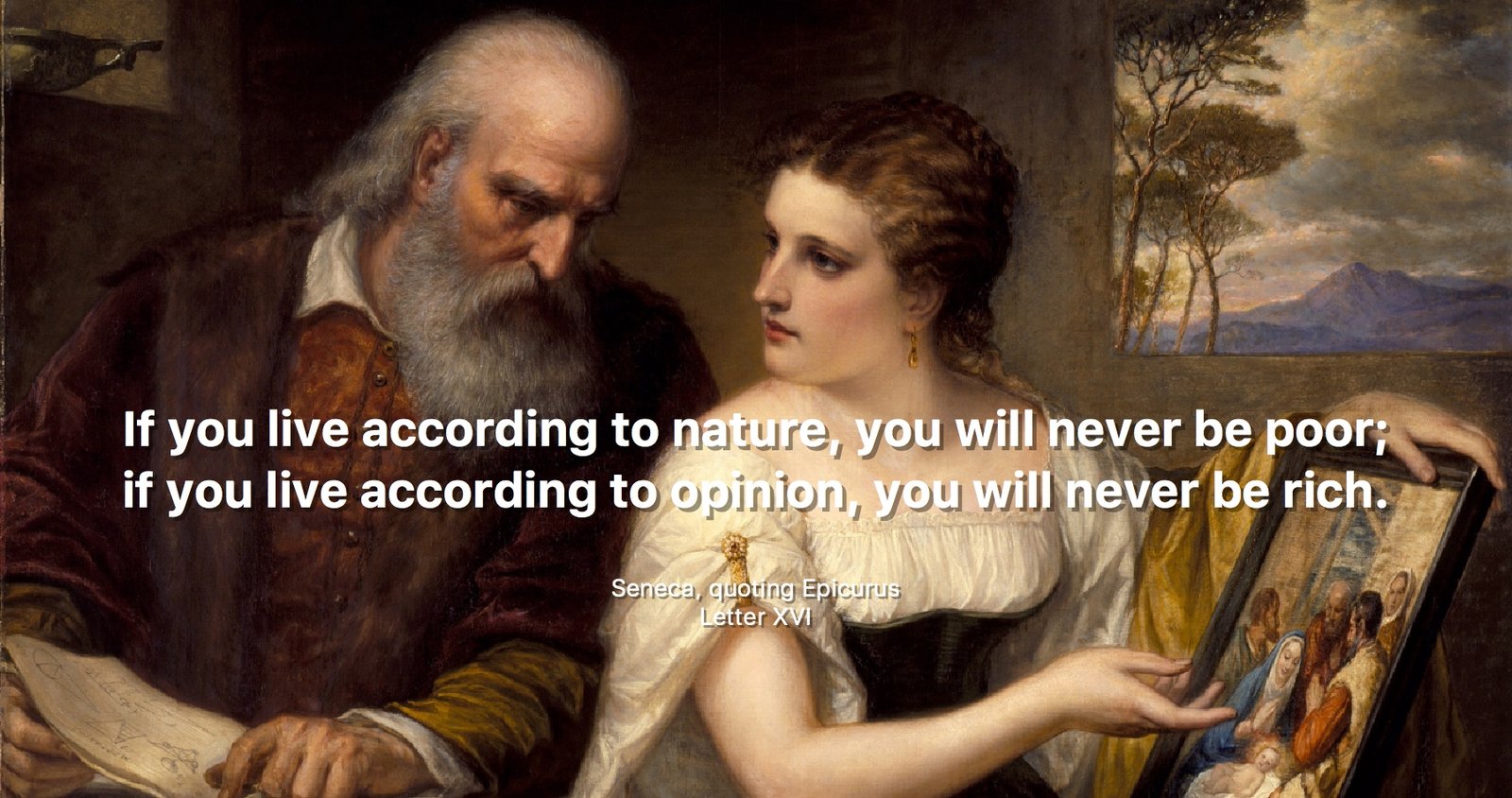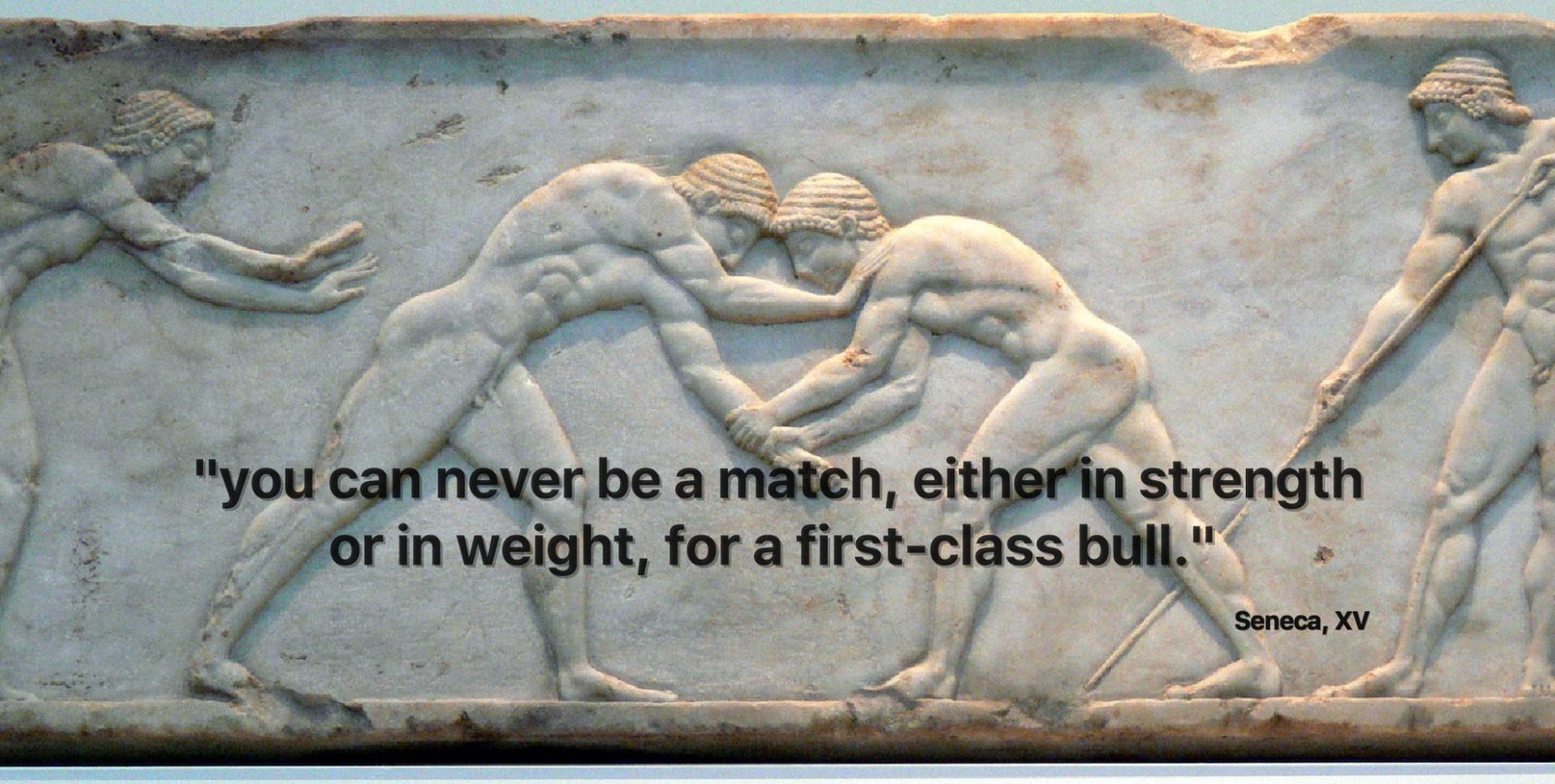Seneca’s Letters offer something beyond philosophy: you get occasional glimpses of his private life,, as well as life in Rome at the height of imperial power. This is a great bonus beyond philosophical knowledge!
This is one of my favorite letters, where Seneca gives the advice not to abstain from amusement, but simply not to exaggerate:
“It shows much more courage to remain dry and sober when the mob is drunk and vomiting; but it shows greater self-control to refuse to withdraw oneself and to do what the crowd does, but in a different way, – thus neither making oneself conspicuous nor becoming one of the crowd. For one may keep holiday without extravagance.” (XVIII, 4)
This is exactly how I feel at Carnival, Christmas and so on. Of course we want to have fun and share a pleasant moment of life with our family and friends. But do we have to get drunk or sick from eating too much to do that? Seneca then uses the topic in question to present a more general point about a standard stoic exercise, moderate self-privation:
“… follow the custom of these men, and set apart certain days on which you shall withdraw from your business and make yourself at home with the scantiest fare. Establish business relations with poverty…. For he alone is in kinship with God who has scorned wealth. Of course I do not forbid you to possess it, but I would have you reach the point at which you possess it dauntlessly; this can be accomplished only by persuading yourself that you can live happily without it as well as with it, and by regarding riches always as likely to elude you.” (XVIII, 12-13)
Points:
- No need to abstain from amusement, but simply do not exaggerate;
- Practice moderate self-privation;
- Get used to frugality.
image: Antoine-François Callet (1741 – 1823) baroque interpretation of Saturnalia
XVIII. On Festivals and Fasting
1. It is the month of December, and yet the city is at this very moment in a sweat. Licence is given to the general merrymaking. Everything resounds with mighty preparations, – as if the Saturnalia differed at all from the usual business day! So true it is that the difference is nil, that I regard as correct the remark of the man who said: “Once December was a month; now it is a year.”[1]
2. If I had you with me, I should be glad to consult you and find out what you think should be done, – whether we ought to make no change in our daily routine, or whether, in order not to be out of sympathy with the ways of the public, we should dine in gayer fashion and doff the toga.[2] As it is now, we Romans have changed our dress for the sake of pleasure and holiday-making, though in former times that was only customary when the State was disturbed and had fallen on evil days.
3. I am sure that, if I know you aright, playing the part of an umpire you would have wished that we should be neither like the liberty-capped[3] throng in all ways, nor in all ways unlike them; unless, perhaps, this is just the season when we ought to lay down the law to the soul, and bid it be alone in refraining from pleasures just when the whole mob has let itself go in pleasures; for this is the surest proof which a man can get of his own constancy, if he neither seeks the things which are seductive and allure him to luxury, nor is led into them.
4. It shows much more courage to remain dry and sober when the mob is drunk and vomiting; but it shows greater self-control to refuse to withdraw oneself and to do what the crowd does, but in a different way, – thus neither making oneself conspicuous nor becoming one of the crowd. For one may keep holiday without extravagance.
5. I am so firmly determined, however, to test the constancy of your mind that, drawing from the teachings of great men, I shall give you also a lesson: Set aside a certain number of days, during which you shall be content with the scantiest and cheapest fare, with coarse and rough dress, saying to yourself the while: “Is this the condition that I feared?”
6. It is precisely in times of immunity from care that the soul should toughen itself beforehand for occasions of greater stress, and it is while Fortune is kind that it should fortify itself against her violence. In days of peace the soldier performs manoeuvres, throws up earthworks with no enemy in sight, and wearies himself by gratuitous toil, in order that he may be equal to unavoidable toil. If you would not have a man flinch when the crisis comes, train him before it comes. Such is the course which those men[4] have followed who, in their imitation of poverty, have every month come almost to want, that they might never recoil from what they had so often rehearsed.
7. You need not suppose that I mean meals like Timon’s, or “paupers’ huts,”[5] or any other device which luxurious millionaires use to beguile the tedium of their lives. Let the pallet be a real one, and the coarse cloak; let the bread be hard and grimy. Endure all this for three or four days at a time, sometimes for more, so that it may be a test of yourself instead of a mere hobby. Then, I assure you, my dear Lucilius, you will leap for joy when filled with a pennyworth of food, and you will understand that a man’s peace of mind does not depend upon Fortune; for, even when angry she grants enough for our needs.
8. There is no reason, however, why you should think that you are doing anything great; for you will merely be doing what many thousands of slaves and many thousands of poor men are doing every day. But you may credit yourself with this item, – that you will not be doing it under compulsion, and that it will be as easy for you to endure it permanently as to make the experiment from time to time. Let us practise our strokes on the “dummy”;[6] let us become intimate with poverty, so that Fortune may not catch us off our guard. We shall be rich with all the more comfort, if we once learn how far poverty is from being a burden.
9. Even Epicurus, the teacher of pleasure, used to observe stated intervals, during which he satisfied his hunger in niggardly fashion; he wished to see whether he thereby fell short of full and complete happiness, and, if so, by what amount he fell short, and whether this amount was worth purchasing at the price of great effort. At any rate, he makes such a statement in the well known letter written to Polyaenus in the archonship of Charinus.[7] Indeed, he boasts that he himself lived on less than a penny, but that Metrodorus, whose progress was not yet so great, needed a whole penny.
10. Do you think that there can be fulness on such fare? Yes, and there is pleasure also, – not that shifty and fleeting pleasure which needs a fillip now and then, but a pleasure that is steadfast and sure. For though water, barley-meal, and crusts of barley-bread, are not a cheerful diet, yet it is the highest kind of pleasure to be able to derive pleasure from this sort of food, and to have reduced one’s needs to that modicum which no unfairness of Fortune can snatch away.
11. Even prison fare is more generous; and those who have been set apart for capital punishment are not so meanly fed by the man who is to execute them. Therefore, what a noble soul must one have, to descend of one’s own free will to a diet which even those who have been sentenced to death have not to fear! This is indeed forestalling the spear-thrusts of Fortune.
12. So begin, my dear Lucilius, to follow the custom of these men, and set apart certain days on which you shall withdraw from your business and make yourself at home with the scantiest fare. Establish business relations with poverty.
Dare, O my friend, to scorn the sight of wealth,
And mould thyself to kinship with thy God.[8]13. For he alone is in kinship with God who has scorned wealth. Of course I do not forbid you to possess it, but I would have you reach the point at which you possess it dauntlessly; this can be accomplished only by persuading yourself that you can live happily without it as well as with it, and by regarding riches always as likely to elude you.
14. But now I must begin to fold up my letter. “Settle your debts first,” you cry. Here is a draft on Epicurus; he will pay down the sum: “Ungoverned anger begets madness.“[9] You cannot help knowing the truth of these words, since you have had not only slaves, but also enemies.
15. But indeed this emotion blazes out against all sorts of persons; it springs from love as much as from hate, and shows itself not less in serious matters than in jest and sport. And it makes no difference how important the provocation may be, but into what kind of soul it penetrates. Similarly with fire; it does not matter how great is the flame, but what it falls upon. For solid timbers have repelled a very great fire; conversely, dry and easily inflammable stuff nourishes the slightest spark into a conflagration. So it is with anger, my dear Lucilius; the outcome of a mighty anger is madness, and hence anger should be avoided, not merely that we may escape excess, but that we may have a healthy mind.
Farewell
Footnotes
- ↑ i.e., the whole year is a Saturnalia.
- ↑ For a dinner dress.
- ↑ The pilleus was worn by newly freed slaves and by the Roman populace on festal occasions.
- ↑ The Epicurians. Cf. § 9 and Epicurus, Frag. 158. Usener.
- ↑ Cf. Ep. c. 6 and Martial, iii. 48.
- ↑ The post which gladiators used when preparing themselves for combats in the arena.
- ↑ Usually identified with Chaerimus, 307-8 B.C. But Wilhelm, Öster Jahreshefte, V.136, has shown that there is probably no confusion of names. A Charinus was archon at Athens in 290-89; see Johnson, Class. Phil. ix. p. 256.
- ↑ Vergil, Aeneid, viii. 364 f.
- ↑ Frag. 484 Usener.









